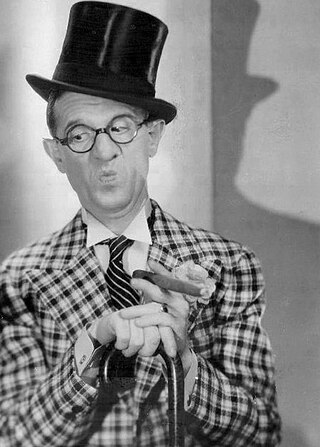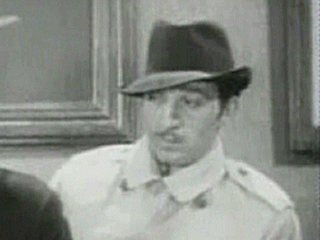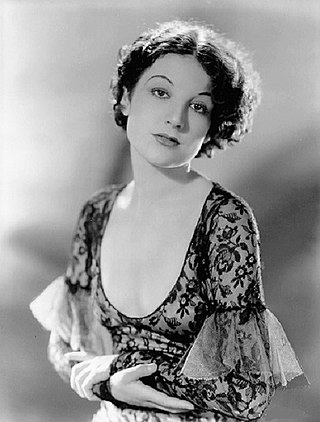
Phyllis Virginia "Bebe" Daniels was an American actress, singer, dancer, writer, and producer.

Wheeler & Woolsey were an American vaudeville comedy double act who performed together in comedy films from the late 1920s. The team comprised Bert Wheeler (1895–1968) of New Jersey and Robert Woolsey (1888–1938) of Illinois.

Albert Jerome Wheeler was an American comedian who performed in Broadway theatre, American comedy feature films, and vaudeville acts. He was the comedy partner of Robert Woolsey, and together they formed a successful double act called Wheeler & Woolsey.

Robert Rolla Woolsey was an American stage and screen comedian and half of the 1930s comedy team Wheeler & Woolsey.

Dixiana (1930) is a lavish American pre-Code comedy, musical film directed by Luther Reed and produced and distributed by RKO Radio Pictures. The final twenty minutes of the picture were photographed in Technicolor. The film stars Bebe Daniels, Everett Marshall, Bert Wheeler, Robert Woolsey, Joseph Cawthorn, Jobyna Howland, Ralf Harolde, Bill "Bojangles" Robinson and Dorothy Lee. The script was adapted by Luther Reed from a story by Anne Caldwell.

John Boles was an American singer and actor best known for playing Victor Moritz in the 1931 film Frankenstein.

Rio Rita is a 1927 stage musical with a book by Guy Bolton and Fred Thompson, music by Harry Tierney, lyrics by Joseph McCarthy, and produced by Florenz Ziegfeld. This musical united Bert Wheeler and Robert Woolsey as a comedy team and made them famous.

Rio Rita is a 1942 American comedy film directed by S. Sylvan Simon and starring Abbott and Costello. It was based upon the 1927 Flo Ziegfeld Broadway musical, which was previously made into a 1929 film also titled Rio Rita that starred the comedy team of Wheeler & Woolsey. Kathryn Grayson and John Carroll replace the 1929 version's Bebe Daniels and John Boles.

Georges Renavent was a French-American actor in film, Broadway plays and operator of American Grand Guignol. He was born in Paris, France. In 1914, he immigrated to the United States, crossing the frontier between Canada and Vermont.

The Stolen Jools is a 1931 American pre-Code comedy short produced by the Masquers Club of Hollywood, featuring many cameo appearances by film stars of the day. The stars appeared in the film, distributed by Paramount Pictures, to raise funds for the National Vaudeville Artists Tuberculosis Sanitarium. The UCLA Film and Television Archive entry for this film says—as do the credits—that the film was co-sponsored by Chesterfield cigarettes to support the "fine work" of the NVA sanitarium.

Dorothy Lee was an American actress and comedian during the 1930s. She appeared in 28 films, usually appearing alongside the Wheeler & Woolsey comedy team.

Phyllis Barry was an English film actress. Born in Leeds, West Riding of Yorkshire, England, to Seth Henry and Bertha Hillyard, Barry appeared in over 40 films between 1925 and 1947.

The Cuckoos is a 1930 American Pre-Code musical comedy film released by RKO Radio Pictures and partially filmed in two-strip Technicolor. Directed by Paul Sloane, the screenplay was adapted by Cyrus Wood from the 1926 Broadway musical The Ramblers by Guy Bolton, Bert Kalmar and Harry Ruby. The film stars Bert Wheeler and Robert Woolsey, and while they had appeared on Broadway and in other films together, this was their first time starring as a team. The success of this picture, combined with Rio Rita being their most successful film of 1929, convinced the studio to headline them as the comedy team Wheeler & Woolsey, through 1937.

J. Harold Murray was an American baritone singer and actor. For more than a decade, during the Roaring Twenties and the Depression Thirties, he contributed to the development of musical theater by bridging vaudeville, operetta and the modern American musical. The most popular American songs he introduced on Broadway included "Autumn in New York" ; "Let's Have Another Cup of Coffee" and "Soft Lights and Sweet Music" ; "Rio Rita", "The Kinkajou" and "The Rangers Song" ; and "Mandalay".

Clark and McCullough were a comedy team consisting of comedians Bobby Clark and Paul McCullough. They starred in a series of short films during the 1920s and 1930s. Bobby Clark was the fast-talking wisecracker with painted-on eyeglasses; Paul McCullough was his easygoing assistant named Blodgett.

Caught Plastered is a 1931 American Pre-Code musical comedy film, released by RKO Radio Pictures and starring the comedy team Wheeler & Woolsey.

Love Comes Along is a 1930 American romantic film directed by Rupert Julian, written by Wallace Smith, based on the uncompleted play Conchita by Edward Knoblock. It was a vehicle specifically picked to highlight the vocal talents of Bebe Daniels, which also starred Lloyd Hughes and Montagu Love. It made a profit of $258,000.

Hugh Trevor was an American actor whose short career began at the very end of the silent era in 1927. He would appear in nineteen films in the scant six years during which he was active. He did not fare well with the advent of talking pictures, and retired from the industry in 1931. His life was cut short when he unexpectedly died from complications following appendectomy surgery in 1933.
Lee Marcus, also known as Lee S. Marcus, was an American film producer of the 1930s and 1940s. During his fifteen-year career he produced over 85 films, most of them between 1934 and 1941 while he was at RKO Studios. Prior to his production career, Marcus worked for FBO and then RKO as a sales executive, reaching the level of vice president in both organizations. At RKO, he was head of production of the studio's b-films during the late 1930s and the beginning of the 1940s. He was also responsible for producing what many consider to be the first film noir, 1940's Stranger on the Third Floor.




















